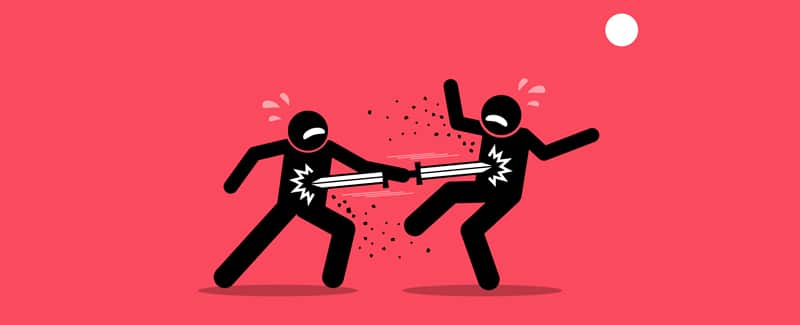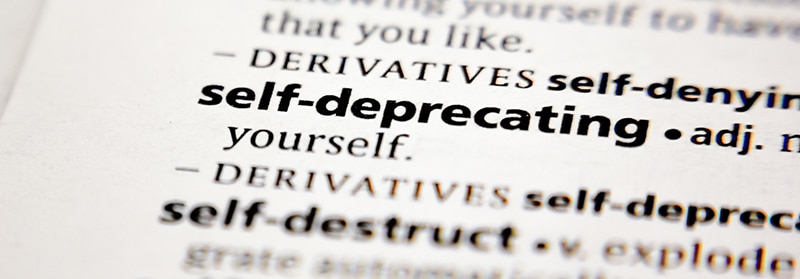Self-deprecating jokes represent a brand of humor that has been around for ages. But thanks to the Internet and social media, it has gained a lot more visibility in recent times. So, what is self-deprecating humor?
Self-deprecating humor is engaging in funny talks with friends or publicly about things you do not like in you. It could be about your appearance, behaviors, habits, etc. For a self-deprecating joke to work, it must be genuine and not fabricated. Some level of exaggeration is, however, okay.
Keep reading to learn more about self-deprecation, some popular self-deprecating jokes from across the Internet, how self-deprecating humor could help you in various facets of life, and also how it could be a double-edged sword.

What Does Self-Deprecating Mean?
Self-deprecating means to make your abilities, your achievements, or yourself look less significant in front of others. An individual who self-deprecates knows their own flaws and shortcomings and is not scared to talk about them in a public setting. Self-deprecating individuals are the polar opposite of people who are egotistical or excessively proud of themselves.
A short guy making fun of his height is self-deprecation. A fat woman body-shaming herself, a bald guy seeing the funny side of his hairless scalp, etc. are basically self-deprecating acts. Hiding your positive qualities or being modest about your accomplishments and achievements is also a form of self-deprecation.
Self-deprecation is typically considered a positive personality trait. It indicates self-confidence and also helps brings to light the humorous side of the person. Self-deprecation is all good when it’s done within limits. However, when it goes overboard, it could be self-sabotaging and also cease to be amusing anymore.

How Does Self-Deprecation Work Out in Life, Besides Comedy?
Self-deprecation comes in handy in a range of scenarios. Those could be primarily categorized as:
- Self-Defense
Philosophers of Stoicism recommended using self-deprecation as a befitting response to insults or a backhanded compliment. In other words, instead of growing defensive to slurs pointed at you, join in and insult yourself even more. According to the proponents of this theory, self-deprecation would help make the insults feel less offensive or may not hurt at all.
Most importantly, the individual throwing the insults at you will be disheartened by the fact that you didn’t feel upset over the derogatory remarks or did not react the way you were expected to. This, as a result, decreases the likelihood of the individual throwing disparaging remarks at you again.
- An Act of Politeness
In British-English culture and similar cultures, self-deprecation is viewed as modesty. Considered a virtue, modesty is the opposite of boasting or demonstration of one’s self-confidence. Self-boasting is frowned upon in countries such as the UK, Australia, Ireland, and New Zealand.
What is Self-Deprecating Humor?
Self-deprecation is usually done in a light-hearted manner. Though not every time, self-deprecating talks are intended to evoke laughter. The practice, therefore, has become quite synonymous with humor. Self-deprecation is, in fact, an integral aspect of the comical acts of several comedians such as Don Knotts, Woody Allen, Joan Rivers, and Nathan Fielder.
Self-deprecating humor, in the past, was considered a brand of dark humor that entailed demeaning and degrading statements, invariably used to disguise insecurities.
Self-deprecating humor is easy to pull off. The ability to crack jokes and come across as funny may not come to all, but self-deprecation is something everybody should be capable of. Every individual has something frustrating about their character, circumstance, or quality, and making fun of that should not be that complicated. It becomes difficult only when you are not comfortable talking about your shortcomings in front of others.

Popular Examples of Self-Deprecating Humor
As mentioned above, there is no dearth of people with flaws or issues in their lives and who are willing to see the funny side of those things. Here are a few popular self-deprecating humor quotes or thoughts floating online:
- My body is like a temple. However, it’s among the temples found in Thailand where monkeys are allowed to [poop] all over. (Andy Richter)
- My life is like a game of soccer because my mother got me on to the field without knowing that I loathe soccer. (Nate Usher)
- Eating the cooking dough raw is ideal for college students as there is zero cooking time, the dough tastes much better than the actual cookies, and you could die. (Noah Hazel)
- I do not have depression issues. For instance, at this very moment, I have my depression down. I am just good at it. (Brandon Scott Wolf)
- Is it garbage day today? I didn’t know they observed a day in my honor. (dampsandwich)
- Having a crush on a person is extremely exciting. You very well know you would eventually ruin things like every time, but don’t know how, thanks to the endless possibilities. (Bdell)
- Just because you are trash, it doesn’t mean you are not capable of great things. After all, it’s not “garbage cannot”, it’s “garbage can”. (quietcarriage)
- Me walking up to a dead body as a detective, and the first thought that hits my mind: I wish it was me. (Common Sad Girl)
- How could one face their problem if their problem is their face? (Pakalu Papito)
- Let your haters know how it’s done by hating thyself the most. (Cole M. Sprouse)
- My acne is a lot more reliable than my friends. (anonymous)
- I looked in the mirror and jumped because I was shocked by my own ugly. (anonymous)
The Good Side of Self-Deprecating Humor
As mentioned earlier, self-deprecation makes others perceive you as humble and more approachable. And when you lace self-deprecation with humor, you not just evoke laughter but also benefit from the act in different ways.
A simple joke targeting yourself could help you connect with other people – be it in one-to-one conversations or during a presentation. When you criticize yourself, it’s woefully relatable and fosters fresh conversations in uncomfortable scenarios. Affiliative humor, which entails telling jokes most people would find amusing, helps strengthen social relationships.
Contrary to what some may think, you also come across as a confident person when you make fun of yourself. Self-deprecating humor could demonstrate increased levels of self-assurance and happiness.
Also, self-deprecating humor lets you overcome your unpleasant situations by letting you find the funny in pretty much any circumstance. It helps ease anxiety and overcome embarrassing moments.
As per several research studies, self-deprecating humor also helps relieve mental stress. A research carried out by the University of Granada in Spain found self-deprecating humor to boost emotional wellbeing significantly.
Self-Deprecating Humor’s Ill-Effects
Talking about your imperfections and mistakes is certainly a healthy form of self-expression. However, there’s a thin line between self-criticism and self-hate. A lot of tweets and memes circulating online under the garb of “self-deprecation humor” could be detrimental in different ways.

Though jokes on depression, anxiety, feeling worthless, suicidal thoughts, etc. may help with anger-processing or improved sociability, they could affect your mental health and negatively impact your professional life too. Such dark humor could create a negative image and people’s expectations of you would get lower to the point of setting you up for failure.
When you go around telling people you aren’t good at something, do not expect people to think of you otherwise.
Context holds the key. Self-deprecation should be avoided at the workplace or in any professional setting, particularly when your supervisors are around. If you go around self-deprecating and habitually giving the negative vibes, your boss is likely to not consider you for the next raise or promotion.
Also, do not self-deprecate in front of people younger than you, particularly if the funny story is something as silly as forgetting where you parked your car last evening. Sharing these funny anecdotes about your memory would be cathartic or ease your sense of embarrassment only when you do it with people of your age, and not with your juniors.
Self-deprecation is not always funny. And when it’s not, it could become embarrassing and tedious. There are many people waiting for the right opportunity to bring you down. Do not make their jobs easier by putting yourself down. Even comedians who have made a career our of self-deprecation jokes have reached a point when they did not want to do it anymore.
Conclusion
To not take yourself too seriously is a great quality to have. A joke that’s self-aware won’t just diffuse uncomfortable situations, but it could also lead to increased emotional well-being. Having said that, self-deprecation works or benefits only when done in moderation or in the right scenarios. Otherwise, it may end up doing more damage than good.
Also, you shouldn’t deep-dive into self-deprecation so much that receiving a compliment makes you feel uncomfortable or even scared. Invalidating a compliment just for humility’s sake is not always the right ploy. Most importantly, the inability to receive or acknowledge praise could signal some deep-seated problems within you.
Long story short, self-deprecation is healthy and beneficial when it’s a mark of confidence and modesty. But when it reflects low self-esteem, you may have to do some serious self-introspection. Complimenting yourself every now and again could be the perfect antidote to this malady.
Shawn Manaher is the founder and CEO of The Content Authority. He’s one part content manager, one part writing ninja organizer, and two parts leader of top content creators. You don’t even want to know what he calls pancakes.

